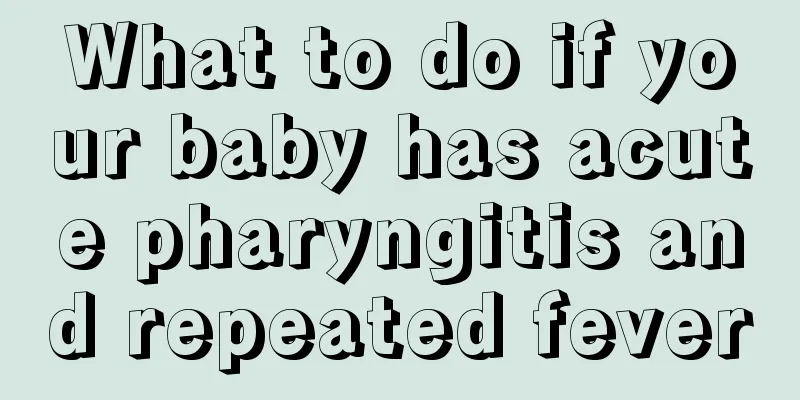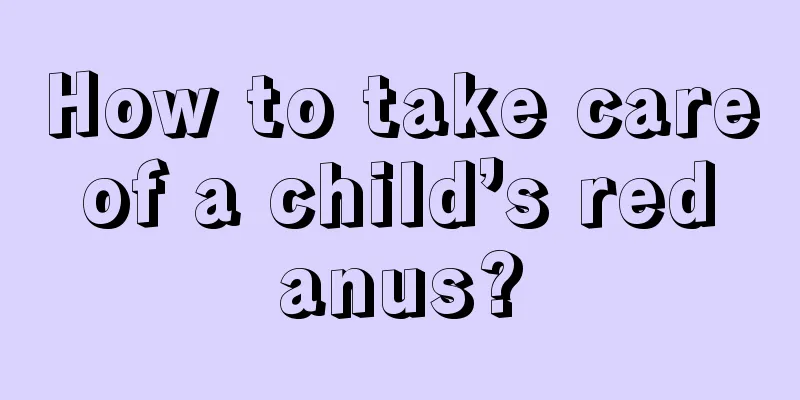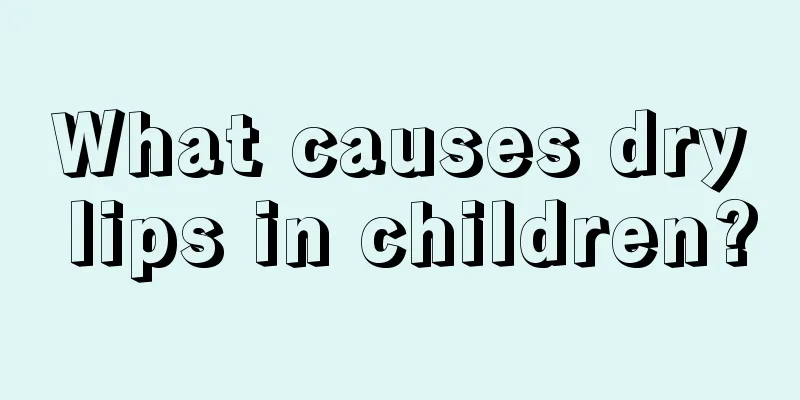What to do if your child has a fever while teething

|
When children are changing their teeth, they sometimes show some abnormal phenomena, such as crying easily and drooling easily. Because the teeth will always feel itchy when changing, they like to bite harder things with their teeth. They may also show loss of appetite, etc. At this time, parents should provide timely care and physical cooling if a fever occurs. 1. The normal baby's basal body temperature is 36.9℃~37.5℃. Generally, when the body temperature exceeds the basal body temperature by more than 1°C, it is considered a fever. Among them, low fever refers to body temperature fluctuating around 38°C, and high fever refers to body temperature above 39°C. Continuous fever for more than two weeks is called long-term fever. 2. If the baby's temperature is below 38.5 degrees, use physical methods to reduce the fever. It is best to give the baby more water. Pay attention to whether the ambient temperature is too high. In the hot summer, the temperature is very high and the baby's ability to regulate body temperature is poor. When the mother holds the baby, the heat is not easy to dissipate, causing the body temperature to rise. However, this kind of fever usually does not last too long. Put the baby in a cool place, fan him slightly, give him some cool fruit juice, or give him a warm bath, and the body temperature will return to normal after a few hours. In winter, if the indoor temperature is too high and the baby is wrapped too much, the baby's body temperature will also rise. 3. If your baby has a high fever above 38.5 degrees, please ask a doctor immediately to confirm whether it is a viral infection or a bacterial infection. If it is a viral infection, use antiviral drugs such as ribavirin. If it is a bacterial infection, use antibiotics such as cephalosporins. Don't rush to reduce the fever. Fever is only a symptom. The cause of the disease must be found out. Baby teething precautions 1. If you want your baby to have good teeth, you must help your baby develop good habits of cleaning the mouth from the age of 0. From the time your baby starts drinking milk after birth, it is best to clean your baby's mouth every time after drinking milk. You can use gauze to clean it or rinse your baby's mouth with clean water. 2. Teething is generally painless, but some babies may feel uncomfortable and irritable. Mothers can use clean fingers or moist gauze to put into the baby's mouth and rub the gums, which will help him. 3. During the teething process, the baby may feel irritable, have unstable sleep, drool at the corners of the mouth, bite things, suck fingers, rub gums, shake the head, and other discomforts. Sometimes there may be pain in the gums, causing a low fever and making the baby cry incessantly. At this time, mothers should take care of their babies more carefully and considerately. Hold your baby more, breastfeed, coax him/her more, and give him/her more comfort. 4. Biting his own hands, biting his mother’s nipples. It can be said that as long as he sees something, he will put it in his mouth and bite it. The purpose is to reduce the pressure of teeth growing under the gums by biting. At this time, avoid letting your baby bite hard objects to cause bleeding gums. You can use clean fingers to gently massage the gums, which will help relieve pain. 5. About 2 months before teething, most babies will drool or put their hands into their mouths to scratch. If the mother carefully examines the baby's mouth, she can see that the gums are partially white or slightly red and swollen, and the gums feel hard like tooth tips when touched. When the baby is drooling, you should put a neck collar on him to protect his neck, and use a soft, absorbent towel to gently wipe the corners of the mouth, cheeks, chin, etc. to avoid redness and wrinkles. 6. The baby's resistance will decrease slightly during this period, so you must pay attention to preventing infection. In cold seasons, the baby should be kept warm and clean. |
<<: Is it a disease for children to snore when sleeping?
>>: What should children eat to grow taller
Recommend
How should rheumatic fever in children be treated?
When you have children, everything in life will r...
Can babies eat durian? Be careful not to get irritated after eating!
Some people just like to eat durian, but as we al...
What is the cause of the hard lump in the baby girl's breast?
Because the fetus is affected by the mother's...
Spontaneous healing of inguinal hernia in children
Children are very young and often develop many di...
Why does the baby eat milk frequently?
Newborns have limited digestive abilities and rel...
Does a one-year-old baby need to go to the hospital if he coughs at night?
Many female friends who have just become mothers ...
Causes of perianal abscess in newborns
Perianal abscess in newborns is a relatively comm...
Two and a half year old baby suddenly stutters
Stuttering is a common language disorder in young...
Two month old baby hasn't had a bowel movement for a week
If a two-month-old baby has not defecated for a w...
Height standard for 18-month-old baby
When many parents with children get together, wha...
Can children eat rooster meat?
Chicken is rich in nutrients and is one of the be...
Do children need to take anti-inflammatory drugs if they have a fever of 38 degrees for two days?
It is a common phenomenon for children to catch a...
What are the methods to treat baby's nasal congestion?
If the baby has a stuffy nose, he will often cry ...
Why doesn’t my four-month-old baby sleep during the day?
When the baby is four months old, he will enter a...
Is the cause of facial eczema in children complicated?
Facial eczema in children is a facial skin diseas...









